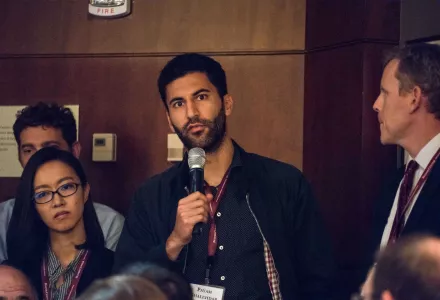
Payam Ghalehdar grew up in Essen, Germany as the son of Iranian parents who fled the Islamic Revolution in 1979. As a child, he was privy to his parent’s nightly discussions on politics and the situation in their native Iran.
“At home, my parents would always have discussions about politics,” Ghalehdar said. “It was part of my life, sitting in the living room and listening to my parents and their friends talking politics all the time.”
Early exposure to political discussions and debates fueled Ghalehdar’s interest in international relations, especially with respect to U.S. foreign policy, but also the Middle East and Iran. His familiarity with the issues—along with his fluency in Farsi, German, and English—also gave him an edge when it came to academics.
Ghalehdar’s research focuses on a subject that has been especially relevant since the Arab Spring: U.S. pursuit of regime change. As a research fellow with the Belfer Center’s International Security Program, he is investigating the role of emotion in U.S. decisions to pursue regime change.
Based on his research on past U.S. interventions, Ghalehdar is finding that decisions to pursue an agenda of regime change is generally based less on the need to tackle a security threat than on the desire of a U.S. leader to discharge what Ghalehdar has coined “emotional frustration.” This frustration is based on a perceived obstruction or anti-American views by a regime’s leadership.
Hence, Ghalehdar argues, the common rhetoric about neutralizing threats and liberating the populace is often not the true motive behind the intervention, but more accurately a rationalization after a decision is already made. Ghalehdar’s research includes a number of case studies, including on the 2003 U.S. invasion of Iraq.
“When leaders or U.S. presidents are emotionally frustrated,” he said, “regime change becomes a very attractive foreign policy instrument for them to relieve that frustration.”
Edel, Jonathan. "The Role of Emotions in Decision-making." Belfer Center Newsletter, Belfer Center for Science and International Affairs, Harvard Kennedy School, Fall/Winter 2017-2018.





